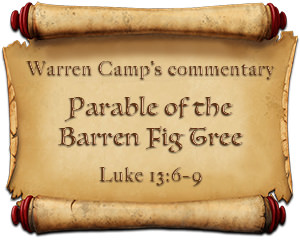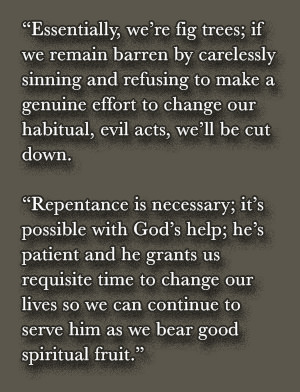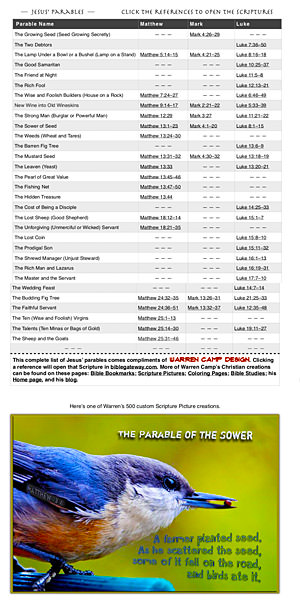
No one wants to be on the receiving end when God’s patience runs out. It’s much better for us to repent while we have the opportunity.
Jesus presents both good and bad news in his Parable of the Barren Fig Tree: It’s good to know that God is merciful and willing to forgive; sadly, even God’s patient mercy can have limits.
Incidentally, Jesus spoke about the heaven-or-hell judgment more than anyone else in the Bible and in a very specific way. More than half of the parables that Jesus told relate to God’s eternal judgment of sinners.

† Find Warren’s short summary at the bottom of page.

Click the list or the “bird” to enlarge and use Warren’s list of forty-four of Jesus’ parables (a PDF file with links to Scriptures).
Start Reading Warren’s Commentary . . .
Find his summary at the bottom.
par•a•ble [noun] a simple story used to illustrate the meaning of or a moral or spiritual lesson, as told by Jesus in the gospels
synonyms: allegory, moral story/tale, fable
Jesus’ Parable of the Barren Fig Tree
Luke 13:6–9
Is this parable’s fig tree “budding” or “barren”? It’s important to realize the difference between this parable and the Parable of the Budding Fig Tree.
The “Barren” Fig Tree Parable appears only in Luke’s gospel. It’s about a fig tree that doesn’t produce fruit. And it gives its readers a dire warning: Unless you repent, you will perish.
The “Budding” Fig Tree Parable, found in Matthew, Mark, and Luke, has Jesus likening the leaves of a budding fig tree to the second coming of Jesus. As well, the “budding” fig tree represents the nation of Israel being politically reestablished in its land once again.
There are several important truths that this short “barren fig tree” parable presents about God, his patience, and what “repentance” means. Repentance isn’t a fashionable word today. Basically it means to change, to stop doing something that’s not productive or taking you in a wrong direction and start doing something productive and, of course, God-honoring.
In addition to Jesus’ two short fig tree parables, he presented four other well-known parables about seeds, vineyards, and weeds: the Parable of the Seed, Soil, and Sower, the Parable of the Growing Seed, the Parable of the Mustard Seed and Yeast, the Parable of the Workers in the Vineyard, and Parable of the Weeds.
This entertaining 3-minute video of the Fig Tree Parable is based on a well-written song by Sheila Hamil.
The Parable of the Barren Fig Tree
In only four verses, Jesus Christ spoke one of his most interesting parables, this one about a barren fig tree.
Let’s first put this parable into context. The reason Jesus told it was because, at that very time, there were some in the crowd who told him about the Galileans whose blood Pilate had mingled with their sacrifices (Luke 13:1).
Repent or Perish
13 1Now there were some present at that time who told Jesus about the Galileans whose blood Pilate had mixed with their sacrifices (Luke 13:1).
They seemingly wanted to know if the reason that Pilate had done that evil act to these Galileans was because they’d sinned. Jesus then asks them, “Do you think that these Galileans were worse sinners than all the other Galileans because they suffered this way?” (v. 2) He immediately told them, no, it had nothing to do with their sinful acts. He added, “But unless you repent, you too will all perish” (v. 3).
In v. 4, Jesus gave them another example when he asked them, “Or those eighteen who died when the tower in Siloam fell on them — do you think they were more guilty than all the others living in Jerusalem?” (v. 4) He answered his question didactically when he told everyone, “I tell you, no! But unless you repent, you too will all perish” (v. 5).
Putting the accounts of the Galileans and Siloams of Jerusalem into perspective, it’s important to realize that there’s no other historic mention of either. Historically, nothing has been written of Pilate’s act mentioned herein. His rule was marked by cruelty towards Jews and contempt for their religious views and rites. Regarding those Jerusalemites who were killed in Siloam when a tower fell on them, th instance presents a striking contrast to the slaughter that the people in the crowd had recounted to Jesus, for it was inflicted upon inhabitants of Jerusalem, coming upon them as an act of God. Jesus therefore concluded in his two declarations (vv. 3 and 5) that all would likewise perish; he pronounced upon the entire people — Jews and Galileans alike — a punishment made certain by the decree of God.
Jesus told the Parable of the Barren Fig Tree immediately after reminding his listeners of a tower over the pool of Siloam, which unexpectedly fell and killed eighteen people. The moral of that story is found in vv. 3, 5. To reiterate this moral, Jesus then told the story of the fig tree, the vineyard owner, and the gardener who took care of the vineyard. Jesus said this to the crowd. . .
6Then he told this parable: “A man had a fig tree growing in his vineyard, and he went to look for fruit on it but did not find any. 7So he said to the man who took care of the vineyard, ‘For three years now I’ve been coming to look for fruit on this fig tree and haven’t found any. Cut it down! Why should it use up the soil?’
8“‘Sir,’ the man replied, ‘leave it alone for one more year, and I’ll dig around it and fertilize it. 9If it bears fruit next year, fine! If not, then cut it down’” (Luke 13:6–9).
Jesus ends his four-verse parable abruptly; there’s no closing recap or reminder. Obviously, he believed that he’d made his point clearly, that is, unless we repent and eventually “bear fruit that’s worthy of repentance” (Luke 3:8), we’ll perish.
Speaking horticulturally Fruit trees require lots of care and proper handling to continue producing fruit, year after year. It’s rewarding to see a tree bending under the weight of apples, pears, oranges, figs, or grapefruit. To go into your backyard and pick fruit that you watched develop and ripen is very rewarding. It should also be instructive when we see how fruit develops on a tree: We see the bloom appear, then the first fruit buds grow and develop through the months. We learn to appreciate that cultivation takes time and care to nurture and develop.
To harvest ripened fruit is why we allow a tree to take up valuable real estate. We’re delighted with an abundant crop. However, when the tree in season is barren, we need to understand why no fruit has been borne. Before delving further into the Parable of the Barren Fig tree, we need to look at what Christ was saying before he told it.
Regarding fig trees in ancient Israel, they occupied a specially favored position. It wasn’t unusual to see fig trees, thorn trees, and apple trees in vineyards. Soil was so shallow and poor that trees were grown wherever there was adequate soil to grow them. But a leafy fig tree encumbered vineyards by occupying ground that vines should have had, and by compromising the access to full sunlight. Add to that the fact that fig trees had a better-than-average chance of producing fruit; however, the barren fig tree in this parable hadn’t proved worthy of living unless and until it became productive. Repeatedly, directly and by implication, Jesus reminded his listeners that, like the fig tree, they’d be judged according to how productive they were with the opportunities they’d been given by God, their vineyard’s owner.
Luke begins chapter 13 by telling us that Christ had been informed “about the Galileans whose blood Pilate had mixed with their sacrifices” (v. 1). Such was an atrocious act committed by the province’s Roman ruler upon the Galileans. We’re not told whether they had provoked the Roman authority: Perhaps it was done in retaliation for their attack of the Romans; possibly it was done on the whim of the Roman governor to display Roman ruthlessness to keep the locals fearful. What we do know is that Christ used it to teach a profound lesson, and as he often did.
When Jesus was speaking about these Galilean people (v. 2), he fully realized that they were human, having their share of weaknesses and strengths. They were going about their daily lives and were suddenly caught up in an unforeseen event. In vv. 4–5, Jesus referred to another well-known recent event that his listeners were familiar with: the collapse of a building onto unsuspecting bystanders. In these words he asked, “Or those eighteen on whom the tower of Siloam fell and killed them, do you think that they were worse sinners than all other men who dwell in Jerusalem? I tell you, no; but unless you repent you will all likewise perish” (emphasis added).
Both of Jesus’ accounts in this parable were everyday stories that all of his listeners knew about. Both accounts called for and suggested repentance, to act differently. In telling them that they’d “likewise perish,” Jesus was warning that they too could become victims like those Galileans and those eighteen Siloams who’d unexpectedly caught up in circumstances beyond their control and had their lives snuffed out in an instant. Jesus is emphasizing this sobering point: You don’t have to be a sinner to warrant suffering, but you must nevertheless repent so you’ll not perish.
Repentance
Jesus was being blunt — realistically blunt — with his audience. Plain and simple: Events happened then, now, and in the future over which people have no control. In this parable, Jesus wants us to prepare ourselves for future events by repenting — changing the way we think, speak, and do, realizing that time and chance could unexpectedly strike at any time. Biblically, it means to stop continually breaking the law of God and immediately and devotedly begin to continually obey God’s law.
Coming back to this parable’s pointed message, the vineyard owner’s solution to this unproductive fig tree was blunt: “Cut it down! Why should it use up the soil?” That’s a hard choice to make, one that’s final. Looking carefully at it, this passage shows us an essential truth about God: He’s full of mercy and compassion and is patient and loving. But God is also a God of judgment, which is why this parable fits with the “Judgment” collection of parables. Christ is warning his readers today that a time of final judgment will come in our lives. When linked to the earlier phrase “unless you repent” in vv. 3 and 5, we need to realize and remember that there’s a way for us to prevent ourselves from being terminally “cut down” and rendered as having no value in life.
Don’t worry, don’t despair! The remainder of the parable reveals to us the way out of becoming “cut down” and “valueless.” The keeper of the vineyard answered the owner: “Leave it alone for one more year, and I’ll dig around it and fertilize it. If it bears fruit next year, fine! If not, then cut it down” (vv. 8–9). The vineyard keeper asked for one additional year in which to work with and cultivate the tree, to enable it to produce much good fruit. Hopefully at the next harvest, the wise and attentive keeper will produce a most productive crop.
Who’s Who in This Parable? The three entities in the story all have clear symbolic significance. The vineyard owner is generally regarded as representing God, who had a fig tree planted in his vineyard and came seeking its fruit, rightly expecting to see fruit on his tree and who justly deciding to destroy it when he finds it barren. The gardener (vineyard keeper or vine-dresser) is Jesus who cares for his trees, who doesn’t fail to produce as he sees fit, and who’s offered to cultivate, water, and fertilize them to bring them to their peak of fruitfulness, so they’ll be fully productive.
But, what or who does a fig tree represent? A fig tree was a common symbol for Israel; it may have that meaning here. In this parable, it might also refer to an individual Christian today who’s heard the gospel of Christ. In either case, Jesus herein offers the opportunity for repentance and forgiveness of sin, showing his provision of grace toward his believers. Verse 7’s “for three years” likely relates only to Jesus’ ultimatum: A fig-tree’s failure to bear fruit for three years would justify its being cut down.
It’s possible that Jesus’ reference to “three years” was aimed at the fact that John the Baptizer and Jesus had been preaching the message of repentance throughout Israel for three years. But for many, the fruits of repentance were not forthcoming. John urged people to repent, warning them about the Messiah’s coming, encouraging them to bring forth fruitful acts fit for repentance because the ax was already laid at the root of the tree (Luke 3:8–9). But the Jews were offended by the suggestion that they needed to repent; they rejected their Messiah because he demanded repentance from them. Those to whom Jesus spoke had been called to repentance by the preaching both of John and of Jesus, and had had ample time and opportunity to bring forth the fruits of repentance, and deserved to be destroyed; but, as shown in v. 8’s indefinite reference to “one more year,” they’d still be allowed further opportunity. God, as the vineyard owner, was perfectly justified in tearing down the tree that didn’t bear fruit. The Lord’s ax was already poised over the root of the tree; it was ready to fall on unbelieving Israelites and non-Jewish Gentiles of that day, as well as anyone today who fails to respond to God’s repentance opportunity.
Next in this story, we see the gardener pleading for a little more time for the barren fig tree to remain alive and be productive at harvest time. However, if that barren fig tree continued to fail to produce fruit, it would eventually be cut down. As Jesus said elsewhere, “Every tree that does not bear good fruit is cut down and thrown into the fire” (Matthew 7:19). Thankfully, the compassionate gardener (Jesus) intercedes for more time to water and fertilize the fruitless tree, and the gracious owner of the vineyard (Father God) responds in patience.
Essentially, we’re fig trees; if we remain barren by carelessly sinning and refusing to make a genuine effort to change our habitual, evil acts, we’ll be cut down. Warning: It’s not enough for any of us to say, “Sorry, Lord Jesus, for being barren. I promise I’ll do better.” It doesn’t matter what we say if our actions contradict our promises. If we continue to fail to truly repent, we’ll then perish just as Jesus has declared in vv. 3 and 5.
This 4-minute video from Got Questions Ministries reveals the meaning of Jesus’ “Parable of the Mustard Seed.”
A Hearty Way to Apply the Parable of the Barren Fig Tree
This parable is meant to teach us at least one vital truth: Repentance is necessary; it’s possible with God’s help; he’s patient and he grants us requisite time to change our lives so we can continue to serve him as we bear good spiritual fruit. But God’s patience has a limit. Remember: None of us knows how much time we have left — so don’t be a day late at making the biggest change in your life! Realize that Jesus the gardener is most caring of Father God’s vineyard (kingdom). He’s always inspecting his Father’s vineyard to know the condition of each tree. His desire is that none of his trees perish (2 Peter 3:9) but that all will produce abundant fruit and thereby inherit eternal life.
In the parable, God the vineyard owner grants another year of life to the tree. In the same way, God in his mercy grants each of us another day, another hour, another breath. Christ stands at the door of every man and woman’s heart, knocking and hoping to gain entrance while also requiring repentance from sin. But if he finds no fruit — no repentance — his patience will come to an end. The fruitless, unrepentant individual will be cut down.
Question 1 If you had “one more year” like the fig tree to turn your life around, what would you do?
Question 2 What fruit do you want to be producing by this time next year?
“If it bears fruit next year, fine! If not, then cut it down” (Luke 13:9).

Take our “Parables Quiz.”
See Warren’s other “Parables of Jesus” commentaries.
— Warren’s Concise Summary —
Jesus’ Parable of the Barren Fig Tree tells of a man who plants a fig tree in his vineyard but finds it bears no fruit for three years. He tells his gardener to cut it down since it’s wasting the soil, but the gardener pleads for one more year to nurture and fertilize it, promising to cut it down if it still bears no fruit.
The parable serves as a warning about the need for repentance and spiritual fruitfulness, emphasizing God’s patience and grace but also his expectation that those blessed with opportunity and privilege will produce good works, with the clear implication that persistent unfruitfulness will ultimately result in judgment and removal from his vineyard.

